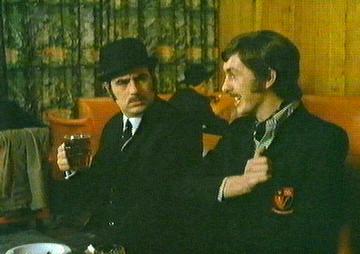http://www.indianexpress.com/story/316869.html
Posted online: Saturday, May 31, 2008 at 0157 hrs
He taught her Hindi, graduated from waiting tables to become her confidante, reveals a new Channel 4 documentary
 Queen Victoria |
|
|
|
London, May 30: Associated with sexual repression and the proverbial stiff upper lip, Britain’s Queen Victoria comes across as a dowdy and matronly but forbidding figure. Now a Channel 4 film presents her in a dramatically different light. Based on an analysis of her diaries and letters, the documentary Queen Victoria’s Men, to be telecast on June 2, reveals that when she wasn’t glowering away from the camera, Victoria loved men and needed to be loved by them in return, not only as a queen, but as a passionate woman who revelled in her sexuality.
The film charts her relationship with the five most important men in her life. Prince Albert, her husband; two prime ministers, Lord Melbourne and Benjamin Disraeli; and two servants, Scott John Brown and, most unlikely of all, Munshi Hafiz Abdul Karim from Agra.
Portraying Victoria’s relationship with her German husband as volatile and intense, the documentary attempts to show how Albert, although deeply fond of his wife of 21 years, could be exceedingly controlling—perhaps as a reaction to his unpopularity with the British public and the Parliament’s dismissive stance towards him. Denied the role of King, and painfully aware of being an outsider, he was determined to be master of his house. Their fiery quarrels could drag on for hours, even days. At the same time, their marriage—which spawned nine children—was also filled with blissful highs to combat the desolate lows. When Prince Albert suddenly died in December 1861, his 42-year-old wife refused to appear in public for years, and imposed punishing mourning rules for herself, even as she hoped for an afterlife reunion.
Nonetheless, even as she grieved in her private chambers, the Queen grew to increasingly rely upon Albert’s favourite servant, John Brown. In a strange parallel to the intense public scrutiny that Princess Diana was subjected to, Victoria’s friendship with Brown triggered widespread rumours that they even had a secret marriage. While there is no evidence of that, there are indications that Queen Victoria and Brown, who died in 1883, shared more than a platonic relationship.
The film goes on to document how Lord Melbourne, who helped her during her early reign, and later Benjamin Disraeli also shared an intimate equation with her. She is said to have enjoyed the exotic looks and witty eccentricities of the half-Jewish prime minister, who flattered her with saucy nicknames like ‘Faery Queen’ and the more dignified ‘empress of India.’
But the strangest relationship that the stout ‘Faery Queen’ engaged in was with Indian ‘khidmatgar’ Abdul Karim, who taught her Hindu and Urdu, while also introducing her to the spirituality of India. He began to teach her Hindi and Urdu, and the unlikely twosome were often found immersed in deep discussions about Indian philosophy. He even proclaimed himself the Queen’s Munshi. Tellingly, within two years of his arrival he was moved from the servant’s quarters, and was instated as a member of the royal household, where he lived in a charming cottage on the palace grounds.
On more than one occasion, other members of the royal household threatened to resign, as the Munshi graduated from waiting tables to being a confidante. Victoria did not seem to care that her staff resented the friendship, and she often admonished those who did not have the highest praise for her friend, who was always by her side, often assisting in her daily administration with letters that came from her Indian subjects.
Even though he was once accuse of obtaining confidential letters and passing them to a friend who was connected with the groups that had begun to fight for the independence of India. But Victoria never doubted the loyalty of her trusted Munshi.
The Queen was well aware of the widespread dislike for Munshi among her courtiers. It was certain that after her death Munshi Karim’s good fortune would come to a sudden halt. So she wrote to the Viceroy Lord Lansdowne to make him a substantial land grant in India. She even asked Lansdowne: “When the viceroy goes to Agra, the Queen Empress hopes he will see Dr Wuzeeredin (Karim’s father) and tell him how satisfied she is with his son.”
The Viceroy could never understand how could his Queen be involved with the affairs of a low-born servant. Lansdowne dragged the issue for a long time, but had to finally submit before the wishes of his sovereign though making some uncharitable remarks such as why was Victoria so struck with Abdul Karim?
There was no doubt that that Karim had lied to the Queen about his family, claiming that his father was medical practitioner in Agra. Later when a courtier confronted the Queen with evidence of Abdul Karim’s doubtful doings and telling her that his father was no doctor, she is said to have angrily responded that this was typical of “you British”.
After Victoria’s death in 1901 Munshi Abdul Karim burnt all his papers and never spoke a word about his benefactor, until he died in 1909.

